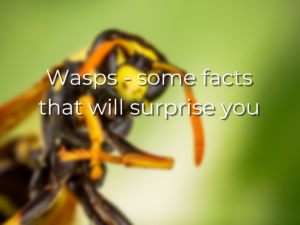A few facts about wasps that might surprise you
Wasps aren’t all bad
Here’s a thing: there are more than 30,000 species of wasp in the world overall… incredibly about 9,000 in the UK alone… but only nine species in the UK form the large nests we all try our best to avoid.
In fact most wasps live on their own, and most won’t sting you… ever.
Wasps are omnivores, and while adults will eat animal remains with their powerful jaws, they are genuinely a huge benefit for farmers and gardeners, as they are pollinators, like bees, and eat mainly pests like aphids.
In fact, nearly every pest we know of is preyed upon by a species of wasp. There is even a species of wasp that preys on clothes moths!
In their social colonies, worker wasps bring food to the larvae, which then turn the protein into sugar and carbohydrate that they use to feed the worker wasps. Those jaws also get put to use building the nests, which are built from wood that the wasps chew into a pulp.
While the wasp colony will only use a nest for one year, after which the workers die, leaving just the newly mated Queen to form a new nest the next year, the nest itself is often adopted by other insects.
Wasps come in many shapes and sizes, the smallest is just 1mm and the largest can grow to be over 1.5 inches! And not all are the yellow and brown striped variations that mean we confuse them so often with bees. The way to tell them apart is that wasps have a pointed lower abdomen and a narrow “waist” called a petiole.
When it comes to colour, wasps can be brown with yellow stripes, but they can also be metallic blue or bright red. And the brighter they are the more likely they will be to sting – but only if they are female. In all species, the males have no sting.
Despite the fear they sometimes evoke, even the solitary ones, wasps are actually extremely beneficial. So the next time you see a wasp don’t panic, stay calm and it will likely buzz by in a second. At this time of year it will be looking for a tasty pest to dine on, not you. It’s a little later in the year, late summer onwards that they start to look for sugary sources of food including all those soft drinks, ice creams and picnic foods.
If in any doubt about wasps in and around your property, give us a call, we’ll advise and act appropriately.

